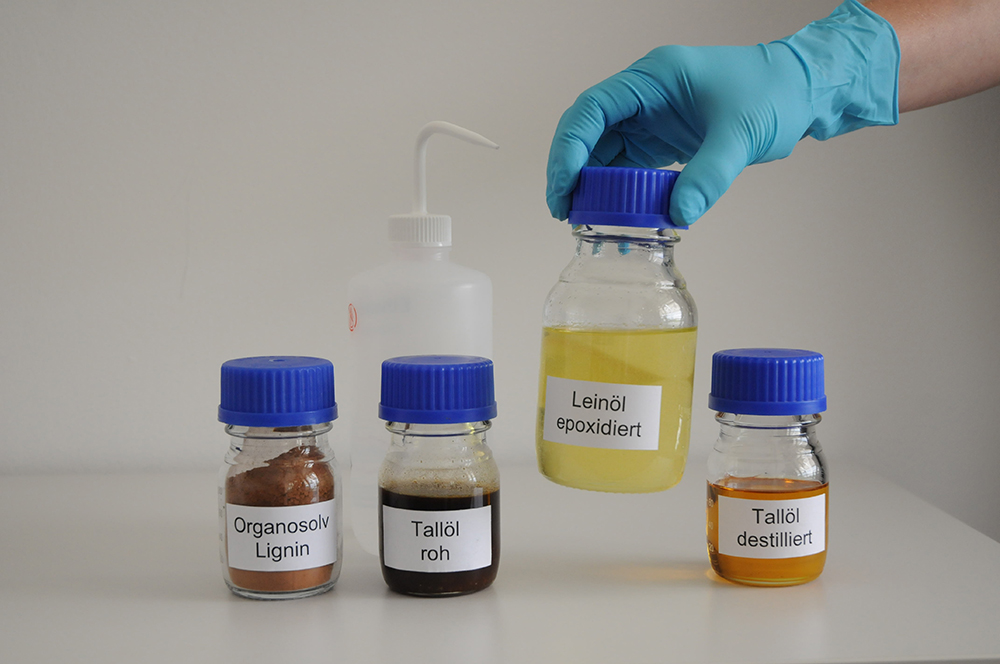From tree to structural foam
Plastics made from organic mass have been developed at the Fraunhofer Institute for Microstructure of Materials and Systems IMWS in a group research project by the BioEconomy leading-edge cluster. The result is sustainable organic polymers based on tall oil, which can be used in building and furniture-making as floor coverings and structural foams.

Countless everyday products are made from crude oil. However, the raw material is an exhaustible resource. In order to satisfy the needs of industry in the long-term and still protect the climate, alternatives based on renewable raw materials need to be found, which can replace fossil resources in future.
Six project partners have worked together on the solution in the recently completed research project »Effimat«: Fraunhofer IMWS and the Fraunhofer Center for Chemical-Biotechnological Processes CBP as well as the companies Miltitz Aromatics, Hennecke Polyurethane Technology, BARiT Kunstharz und Belagstechnik and ö_Konzept. Their aim was to develop organic polymers for floor coverings and foams and the respective processing technologies. Such products were previously produced on a crude oil basis. In the project, the partners managed to produce them from tall oil, which is a by-product in the manufacturing of cellulose from wood.
The approach by the cluster project funded by the Federal Ministry for Education and Research was the holistic use of wood as a raw material. The participating companies and research institutes wanted to achieve new scopes for innovative substitution materials, which can replace conventional materials with equivalent or entirely new properties. The starting point for these efforts was the substance mixture tall oil, which can be used as a basis for producing high-quality reactive resin systems using different synthetic treatment stages. Together with a cross linking component, these can be hardened to produce extremely hard plastic materials suitable for use in construction work, for example.
The combination of tall oil with a cold hardening cross linking agent was an entirely new approach in the field of bio-based plastics. By returning the by-product, tall oil, into the production cycle, a further usage stage along the utilisation cascade of wood has been able to be established and the value creation potential increased.
The project partners have also tested a special high-pressure foaming method whereby the resin mix is filled into a corresponding tool mould and foamed using the expansion of a propellant, in order to manufacture semi-finished foam products based on tall oil on an industrial scale. High-quality resin mixes had to be obtained first and an appropriate anhydride-hardener had to be developed. In the following extensive material tests, numerous substance and hardener combinations were characterised with their properties and various mould masses and structural foams were produced on a laboratory scale. Based on these test results, foaming the resin mixes could be tested in parallel on an industrial scale and their specific use could be tested in the form of organic resin-bonded floor coverings. Fraunhofer IMWS manufactured mould masses and foams for the industrial use of material and characterised them mechanically, thermo-mechanically and morphologically.
High-grade artificial resin systems for various applications, which can be modified according to requirements and processing, resulted during the course of the project. »The advantages of the innovative artificial resin systems not only lie in the biogenic origin of the starting materials used, but also in a generally more energy efficient manufacturing method, because vegetable oil based structural foams harden faster at lower temperatures during processing«, says Nicole Eversmann, project leader at Fraunhofer IMWS. Artificial resin systems can also score points in terms of health compatibility. Vegetable oil based plastics are currently mainly used for niche products such as (protective) packaging or bicycle helmets. The material class is also suitable for construction and furniture-making.
